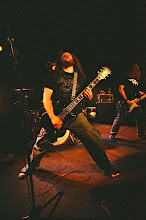Wednesday, January 21, 2009
Rush "Signals"
Rush is a band that is to Canada, what apple pie is to the United States. Rush is hockey, toques, canoes, and Bob and Doug McKenzie. (our ambassadors to the world) Rush is also a musically and lyrically complex band that remind us what can be done with an instrument and an imagination.
Rush released their first album in 1974 and has continued releasing albums ever since. When one discusses Rush, they generally describe them in one of three eras. The ‘early’ era, the ‘eighties,’ and the ‘new’ or ‘current’ era. All of which are distinguishably unique. There is no weak era for Rush, just sonically different from the last.
The early era consists of massive song suites arranged not unlike classical music with bombastic guitars and drums. This time-frame is generally accompanied by the screeching vocals of Geddy Lee and very fantasy oriented lyrics about futuristic races of people, great battles, mythology, and anything else that a fan of “Dungeons and Dragons” would be thinking about.
The ‘eighties’ era became a much softer Rush with the inclusion of keyboards and a less guitar heavy approach. Another key difference is the seemingly puberty linked drop of Geddy Lee’s vocals. No longer was the neighbourhood canine hiding under the couch. While still musically complex, the ‘eighties’ saw less of the obvious ‘guitar hero’ action from Alex Lifeson, who opted to become more of a texture player than a shredder. The songs developed a poppy edge while maintaining their thought provoking topics.
The album that I’m going to discuss today is, “Signals,” an album often forgotten in Rush’s massive catalogue, partly due to the fact that it followed their biggest commercial success, “Moving Pictures.”
“Signals” was released in 1982 and like “Moving Pictures” it continued in a more synthesizer oriented approach rather than their harder rocking earlier albums. While some fans started to drift away from Rush at this point due to their stylistic changes, it was perhaps their most commercially successful period. Long, extended guitar solos and drum interludes gave way to rich textured chordal arpeggios and dense keyboard passages creating a wall of sound filling up shorter catchy songs, still rife with lyrical wonderment and lofty thoughts.
The album opens with the ominous robotic keyboards of “Subdivisions,” the song embodying the whole idea of an electronic and stiff new world. While initially it drifts along with floaty keyboard parts and less than aggressive vocals, the song carries an uncomfortable weight.
Next, “The Analog Kid” kicks in with standard issue ‘impossible to play’ Rush riffage. The difference now being that the band manages to be easy to listen to even though the music is very challenging. True genius. This song is more of a solid rocker than some of the album’s other material, complete with a blistering guitar solo.
“Chemistry” continues with the ‘futuristic’ feel of the album yet lyrically explores questions of a very organic nature. “Chemistry” is full of interesting musical breaks and odd timings and turn-arounds, drummer Neil Peart reminding us that he is super human.
Geddy Lee proves once again that he is one of the top bass players on Earth the second that “Digital Man” kicks in. What is so impressive though is his ability to not sound like he’s over-playing.
“The Weapon” is a synth driven pulsing track that has some fantastic ‘not-guitar solo sections’ where Alex Lifeson really shines with the textural playing that he’s mastered over the last few albums. The song feels like an entire science fiction novel in a six minute song.
The next track, “New World Man” starts out sounding like it could be on a Bruce Cockburn album but then comes out swinging in the choruses.
“Losing It” is a fascinating song that lilts along gently with captivating electric violins throughout. The middle section is a tension building space journey that ends with some distinguishable precision playing and then an accepting realization of what could have been.
“Signals” closes with a rocking song about space travel called “Countdown.” Somehow Rush manages to not go over the top in the cheese factor with a topic that could easily be silly if not well thought out. Fantastic songwriting and a willingness to try new things has kept Rush exciting and fresh through four decades and “Signals” is an album that showcases that spirit. Mike Maggot.
Subscribe to:
Post Comments (Atom)

No comments:
Post a Comment